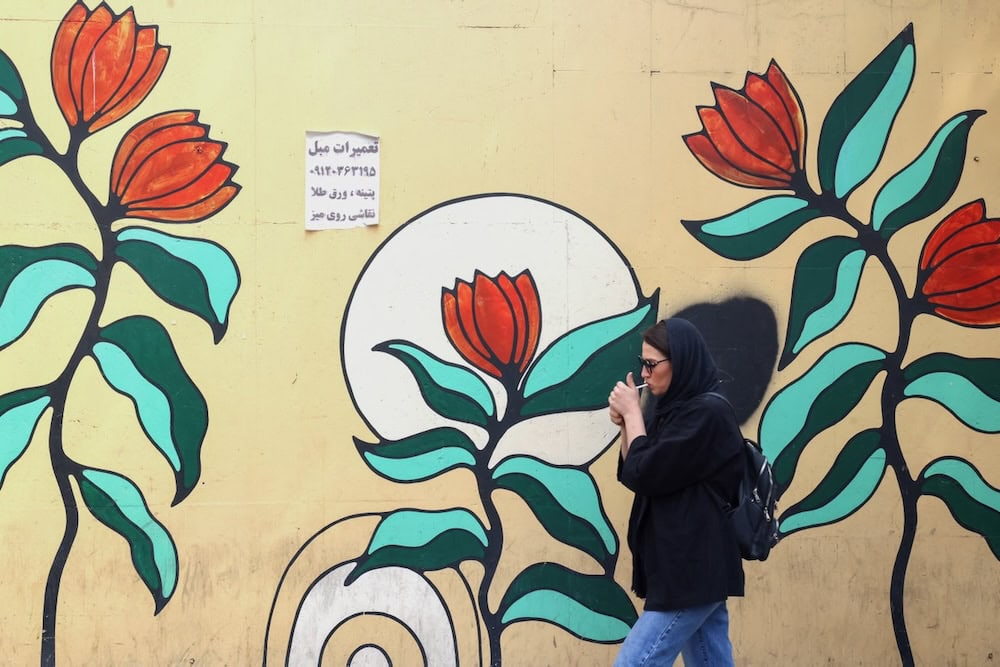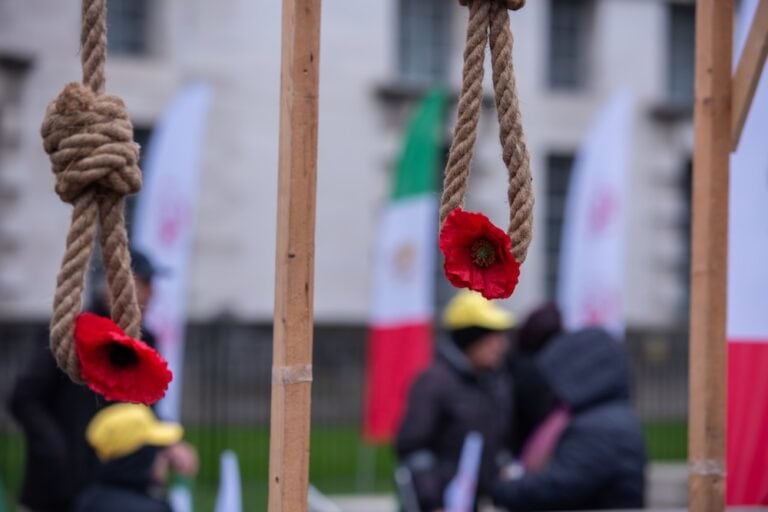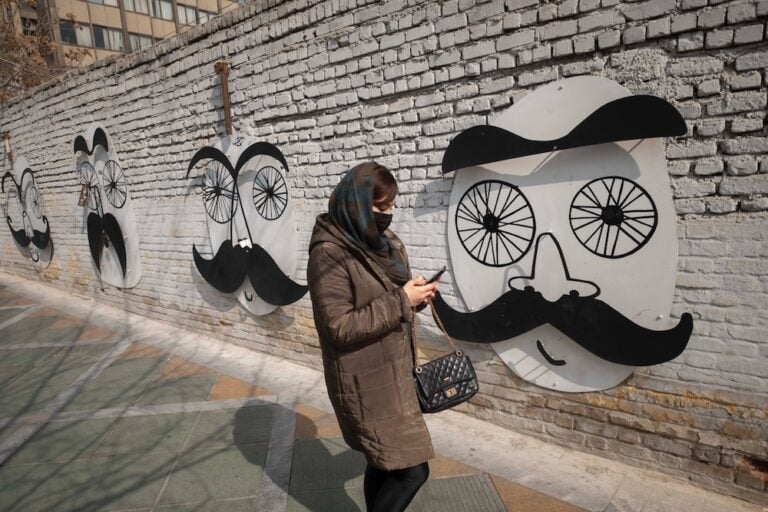Women activists, artists, and social media influencers have particularly faced heightened targeting amidst an ongoing campaign against freedom of expression.
This statement was originally published on gc4hr.org on 13 September 2024.
The Gulf Centre for Human Rights (GCHR) continues to call for accountability and transparency from Iran regarding human rights abuses, particularly of women human rights defenders and women’s rights activists, as we approach the anniversary of the death of Mahsa (Jina) Amini on 16 September 2022, which sparked widespread protests across the country. Iran’s unwillingness to engage with international human rights mechanisms, including its lack of cooperation with special procedures, leaves many defenders vulnerable to violations.
Iran’s Universal Periodic Review (UPR) upcoming
Iran is facing its fourth UPR in January 2025 at the United Nations Human Rights Council (UNHRC). GCHR and CIVICUS made a joint submission to the UPR, highlighting multiple concerns regarding the systematic misuse of the criminal justice system to punish and retaliate against human rights defenders, journalists and protesters, including through the use of the death penalty to punish and deter peaceful human rights work; as well as the violent suppression of protests, the unfair trials leading to death sentences for protesters, and the rampant use of torture. Human rights defenders, including women advocating against compulsory hijab laws, have been subjected to arrests and detentions without due process.
UN Special Procedures express alarm
On 2 September 2024, UN experts expressed alarm over a surge in executions during the month of August 2024 and urged the Islamic Republic of Iran to immediately stop the execution of people facing the death penalty, including 15 women. In June 2024, UN Special Rapporteurs raised concerns about Iran’s treatment of human rights defenders, particularly the imprisonment of Nobel laureate Narges Mohammadi and other prominent activists. In March 2024, the UN Working Group on Arbitrary Detention condemned the arbitrary arrests of human rights defenders in Iran. It urged the release of imprisoned individuals for exercising their freedom of expression. However, Iran has historically refused cooperation with these special procedures, denying visits from UN representatives.
Repression of women and minority rights defenders
Women activists, artists, and social media influencers have faced heightened targeting in the government’s ongoing campaign against freedom of expression, particularly related to women’s rights. Women like Zara Esmaili and Sepideh Gholian have become symbols of defiance despite imprisonment and threats of execution. Ethnic minorities, particularly Kurds and Baloch human rights defenders, have also been systematically targeted, as seen in cases like that of Kurdish journalist Pakhshan Azizi, who was sentenced to death under fabricated charges. These cases are among many that GCHR has been reporting, monitoring, as well as advocating for.
Police campaigns in Iran are increasingly targeting young people, particularly women human rights defenders, activists, artists, and social media influencers. The government’s repressive tactics are aimed at silencing voices that challenge its authority, with a special focus on women who defy strict social and cultural rules.
Among the latest figures to face this crackdown is courageous singer and social media influencer Zara Esmaili, who has openly criticising the authorities’ suppression of freedom through her music and public performances. Despite facing constant threats of imprisonment or worse, she emphasises that “revolutionary voices will not be silenced by prisons or the whips of executioners.”
She has gained prominence for her powerful performances that challenge patriarchal norms and the government’s harsh treatment of women and artists. Esmaili’s music and activism are part of a broader cultural resistance within Iran, especially in the aftermath of the death of Mahsa Amini. She has repeatedly asserted that the voices of dissent will not be silenced by imprisonment or the threat of execution, positioning herself as a key figure in Iran’s women’s rights movement.
Sepideh Gholian is a prominent Iranian labour rights activist and journalist who gained national and international attention after covering and participating in labour protests at the Haft Tappeh sugarcane factory in 2018, which led to her arrest. Gholian has been repeatedly detained, tortured, and sentenced to prison on charges of allegedly “spreading propaganda against the system” and “assembly and collusion against national security.”
Despite facing severe repression, Gholian has continued her activism both inside and outside prison, releasing letters and statements from behind bars. She has also documented the harsh conditions faced by women prisoners in Iran, drawing attention to the mistreatment of political prisoners, especially women. In March 2023, Gholian was briefly released but was rearrested shortly after. Her courage has garnered significant international solidarity from human rights organisations, including Femena, Amnesty International and Human Rights Watch.
Pakhshan Azizi is a Kurdish journalist, social worker, and political prisoner from Iran currently held in Evin Prison. Arrested in 2023, Azizi has been accused of “rebellion” and sentenced to death by the Iranian judiciary, based on fabricated charges human rights organisations believe are designed to silence her activism. Azizi, known for her work with refugees and her outspoken stance on Kurdish rights, has been subjected to torture during her detention.
In a letter smuggled from prison, Azizi recounted severe mistreatment, including being hanged during interrogations. Iranian authorities have also denied her access to legal representation and family visits, adding to concerns about her safety and well-being. The case has garnered attention from international human rights groups, which are calling for urgent intervention to halt her execution and ensure her release. Her sentencing reflects the broader crackdown on Kurdish activists and the systematic targeting of women and ethnic minorities who challenge the authorities’ policies.
Narges Mohammadi, the prominent human rights activist and Nobel Peace Prize laureate, continues to face severe repression from Iranian authorities while imprisoned. Despite ongoing international calls for her release, including a coalition launched by Nobel laureates and human rights groups, Mohammadi remains incarcerated, and her prison sentence has been extended multiple times. Mohammedi was injured in Evin Prison after being beaten by guards for staging a protest on 06 August 2024 with other prisoners against death penalty sentences for activists, including fellow prisoner Pakhshan Azizi, as well as three other women: labour activist Sharifeh Mohammadi, women’s rights activist Varisheh Moradi and Nassim Gholami Simiari.
In June 2024, Mohammadi was sentenced to an additional year in prison by Branch 29 of the Tehran Revolutionary Court, citing her support for the “Woman, Life, Freedom” protests, her letters to Swedish and Norwegian lawmakers, and her criticism of Iranian authorities’ treatment of women in detention. She has also faced ongoing denial of medical care due to her refusal to wear the compulsory hijab during treatment, further jeopardising her health.
Mohammadi, who was first imprisoned in 2011, has been sentenced to a cumulative 36 years in prison and 154 lashes over her activism. Her family and supporters continue to advocate for her release, emphasising the personal and human rights cost of her imprisonment. The international #FreeNarges coalition, which includes Front Line Defenders, PEN America and Reporters Without Borders, has intensified efforts to bring global attention to her case.
Many human rights defenders including musicians have been subjected to arbitrary absurd sentences including death sentences and life sentences. In a significant legal reversal, Iran’s Supreme Court overturned the death sentence of Iranian rapper Toomaj Salehi, a vocal critic of the government. Salehi, who rose to prominence for his outspoken lyrics condemning state repression following the 2022 death of Mahsa Amini, had been sentenced to death by a Revolutionary Court in Esfahan in April 2024 on charges of “spreading corruption on Earth.” His lawyer, Amir Raisian, confirmed the decision, noting that the Supreme Court found the previous six-year prison sentence issued in 2023 excessive and inconsistent with legal standards. Salehi’s case will now be reviewed by another branch of the court. International criticism and calls for his release surged following his arrest for supporting protests against Amini’s death, and he has faced repeated imprisonment and torture during his legal ordeal.
Recommendations:
The Gulf Centre for Human Rights (GCHR) strongly condemns the sentencing, including imposition of the death penalty, and imprisonment of women human rights defenders and activists, including musicians and influencers.
GCHR urges authorities in Iran to:
- Immediately and unconditionally release all women human rights defenders, journalists, and activists who are in prison for their peaceful activities in Iran;
- Carry out a thorough, independent, impartial, and transparent investigation into the death of 22-year-old woman human rights defender Mahsa Amini,
- Halt the imposition of unjust sentences and end systematic targeting of women human rights defenders, including journalists and musicians.



